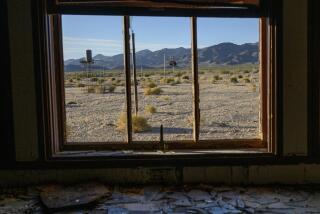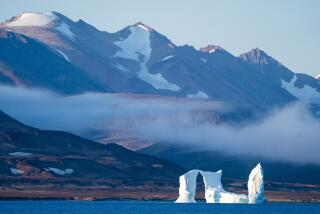Earth may be near tipping point, scientists warn
- Share via
A group of international scientists is sounding a global alarm, warning that population growth, climate change and environmental destruction are pushing Earth toward calamitous — and irreversible — biological changes.
In a paper published in Thursday’s edition of the journal Nature, 22 researchers from a variety of fields liken the human impact to global events eons ago that caused mass extinctions, permanently altering Earth’s biosphere.
“Humans are now forcing another such transition, with the potential to transform Earth rapidly and irreversibly into a state unknown in human experience,” wrote the authors, who are from the U.S., Europe, Canada and South America.
If current trends continue — exploding global population, rapidly rising temperatures and the clearance of more than 40% of Earth’s surface for urban development or agriculture — the planet could reach a tipping point, they say.
“The net effects of what we’re causing could actually be equivalent to an asteroid striking the Earth in a worst-case scenario,” the paper’s lead author, Anthony Barnosky, a professor of integrative biology at UC Berkeley, said in an interview. “I don’t want to sound like Armageddon. I think the point to be made is that if we just ignore all the warning signs of how we’re changing the Earth, the scenario of losses of biodiversity — 75% or more — is not an outlandish scenario at all.”
Global population just passed 7 billion and is expected to reach 9.3 billion or more by 2050. “By the year 2070, we’ll live in a hotter world than it’s been since humans evolved as a species,” Barnosky said.
Increased carbon dioxide in the atmosphere from the burning of fossil fuels is making the ocean more acidic, and less hospitable to sea life. By midcentury, humans could have altered more than half the world’s land surface.
The swiftness of climate change is likely to outpace the ability of species to adapt, especially as natural habitat becomes more fragmented, Barnosky said.
All this could produce a biologically impoverished Earth that would rob humans of vital ecological services such as insects that pollinate crops, forests that provide clean water, and tropical species that are the source of new drugs.
“We have created a bubble of human population and economy … that is totally unsustainable and is either going to have to deflate gradually or is going to burst,” said co-author James Brown, a distinguished professor of biology at the University of New Mexico. “If it’s going to burst, the consequences are really going to be grim for people as well as biodiversity and the rest of the planet.”
Forty years ago, the Club of Rome think tank caused a stir when it argued that there were limits to world growth. In 1968, Paul Ehrlich, now a professor of population studies at Stanford University, warned of the dangers of overpopulation in his book “The Population Bomb.”
“This is what scientists saw in the ‘60s and ‘70s,” said Mikael Fortelius, a professor of evolutionary paleontology at the University of Helsinki in Finland and one of the paper’s authors. “We’ve never been quite sure when it would happen. We’re there now.”
Human influence on the planet has become so pervasive that some scientists have argued in recent years that Earth has entered a new geologic epoch, the Anthropocene.
Predicting the timing and exact nature of sweeping planetary change is difficult because of the complexity of biotic systems.
“We may have already passed the tipping point or we may not get an early warning” that it is near, said co-author Alan Hastings, an ecologist and distinguished professor in UC Davis’ environmental science department.
The authors got the idea for their review at a 2010 UC Berkeley conference devoted to the concept of a global tipping point.
They looked at evidence of past dramatic shifts in Earth’s biosphere, such as the end of the last glacial age, when ice disappeared from nearly a third of the planet’s surface, or the lethal changes in the atmosphere that accompanied periods of intense volcanic activity. The consequences usually included mass species extinction, altered food webs and the emergence of new dominant species.
To avert a grim future, or at least make it less grim, the paper calls for significant reductions in world population growth and per-capita resource use, more efficient energy use, less reliance on fossil fuels and stepped-up efforts to protect the parts of Earth that have so far escaped human dominance.
“I’m not personally particularly optimistic,” Fortelius said. “I think we had to speak up. We have to say what we see. Whether it will have any impact, I really don’t know.”
More to Read
Sign up for Essential California
The most important California stories and recommendations in your inbox every morning.
You may occasionally receive promotional content from the Los Angeles Times.











